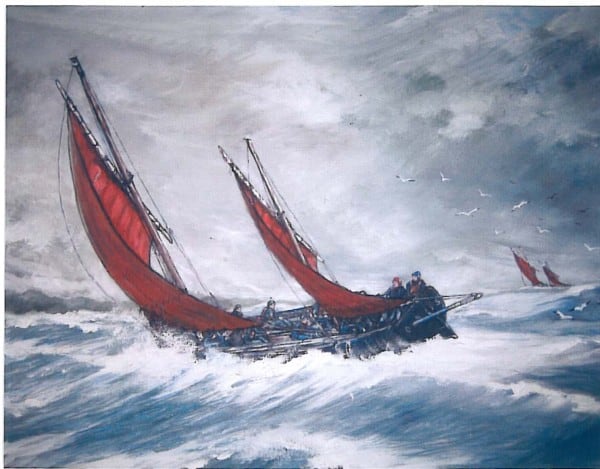It blows hard in April at Aberdovey on the coast of Wales…
Stan Hugill, last chantyman of the British Empire, was the bos’un of the Aberdovey Outward Bound School. The Dovey River runs fast to the sea on an ebbing tide. Shifting sandbars reach out enthusiastically from both shorelines and can only be counted on to appear where deep water had been found only days before. Lying in the cul-de-sac of a high horseshoe pier was a heavy, aging, ketch-rigged, 26-foot open boat. Stan sent twelve lads far down a steel ladder. I followed. Stan and the students warped her out, set sail and lunged off upstream under a strange, difficult rig, adapted from the North and Irish Sea fisheries of the ‘30s and earlier. Three hours later we were all back, stowed sail, climbed the ladder, and marched home to tea.
The Aberdovey cutters were cumbersome. Charitably they could be rowed, sailed when encouraged with conviction and perfect timing, and one could tack, turning through the eyes of the wind and setting off in the new and intended direction, if that seemed necessary. The Dovey is a quarter of a mile wide there. When tacking, sail needs be lowered, the yard dipped ‘round the mast to leeward, employing two boys on a tackle with blocks the size of a man’s head and a dipping line manned by a third. The tack must be taken from the old windward side to the new leeward, the sheets require the same, with blocks comparable to the ones on the halyards with two lads to shift them briskly: a boy on the mizzen sheet, another on the helm. It was a good idea always to have one on the centerboard and if a pair of those lads did not sweat up the halyard on the new windward gunwale to double as a shroud when the mainsail drew in serious wind, you lost the mast. And it blew that day.
On the following afternoon the same drill: downhill, across the pier, down the ladder and into the cutter. The boys went first, I followed, then turned as I reached the boat to lend a hand to Stan, who was then in his sixties. Standing high above on the string piece was Stan Hugill.
“Aw’right Lance,” he called, “Take ‘the lads for a sail.”
Two hours and three sandbanks later I was an experiential educator.

The “initiation” above took place when I was twenty-eight. From age seven I’d spent a good deal of time on the water, lived aboard a Hand motor-sailer, sailed, raced, cruised, taught sailing, and run a charter boat to pay for collge. Thus for me boats—all traditional, almost every one sail—were for pleasure or to earn an income.
. . . sign up to the right to get immediate access to this full post,
plus you'll get 10 of our best videos for free.
Get Free Videos& Learn More Join Now!!for Full Access Members Sign In


John Shaw says:
I have recently joined OCH and was delighted to find this article by Lance Lee.
In 1963, aged 16, I spent a month at the Aberdovey Outward Bound School.
This was a combined Sea and Mountain School where we spent every day packed with challenging activities that required teamwork and fortitude. Long hikes, camping, rope work, navigation on the water and in the forests and mountains, sailing the cutters and kayaking. Before we went sailing and kayaking we had to learn drown proofing.
I remember the cutters very well. In my watch there were six of us called John so we used our middle names on the cutter. The current in the Dovey does run fast.
I agree that the Outward Bound School activities taught us far more than the skills needed to sail, kayak, etc. We learnt how to find our way through all sorts of life challenging situations as I found out later in my medical career and family life. Now 72, I still sail a Drascombe longboat and a Shark24 sloop on Lake St. Clair in Ontario.
Thank you Lance for such an expressive article.
John Shaw
Aberdovey Outward Bound 1963
David Tew says:
Lance,
If you haven’t yet, you must read John Stilgoe’s ‘Lifeboat’. It’s written just for you, if for anyone!
http://www.publishersweekly.com/978-0-8139-2221-8
http://www.amazon.com/Lifeboat-John-R-Stilgoe/product-reviews/0813926939/ref=dp_top_cm_cr_acr_txt?ie=UTF8&showViewpoints=1
Peter Marshall says:
and how you have helped us all in your process…thanks lance